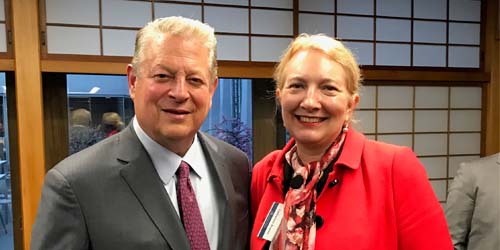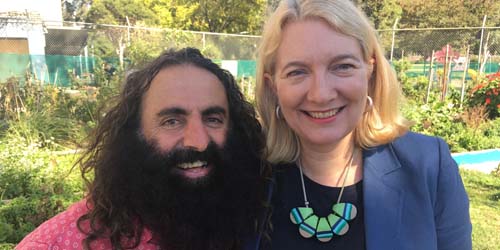While Australia was not ambitious in its commitments at COP26, there is momentum growing in the race to zero.
One highlight for me was the Foundation’s support of the Smart Energy Council’s Global Race to Zero Summit with international and local presenters.
I had the honour of chairing the first session with the Ambassadors from Italy, UK, Denmark and France. It was inspiring to learn about the high ambitions and actions of other countries and the opportunities for Australia to partner on renewable energy and clean technology projects. For example, there is Danish involvement in the Star of the South wind power project in Bass Strait.
This was the year that the Foundation amped up our Clean Technology Powerhouse project with grants to Smart Energy Council (above), Beyond Zero Emissions and the Climate Council and others. The Foundation’s Program Manager for Environment & Sustainability Dan Pediaditis has been leading this work with vision.
We also launched a new initiative, the Next Economy Jobs Challenge, where we are funding job creation projects relating to waste management, renewable energy, sustainable food, sustainable housing construction (and the care economy). Sweet Justice, a beekeeping training and job pathway for young people leaving prison was a knock-out application that won a scaling-up grant.
There have been times this year when I have felt the weight of the climate challenge. Part of the cliff at Anglesea collapsed and there has been wild weather, flooding and bushfires around the world.
I think back to Al Gore’s first version of his climate change documentary An Inconvenient Truth (2006). It is hard to believe that everyone cannot see the change happening around us now. I am increasingly concerned about the responsibilities and difficulties that our children and the following generations will face if we do not succeed in keeping global warming to 1.5° C or below pre-industrial levels.

Al Gore with Dr Catherine Brown OAM.
Our focus for 2022
I invited Stefan Schurig, the Secretary General of the Foundations Platform F20, to meet with the Foundation’s Board last week at our December Board meeting. F20 is a platform for Foundations from G20 countries working on climate change and Sustainable Development Goals (SDGs).
Stefan emphasised the importance of foundations supporting climate resilience as well as emissions reduction. This has a particular importance for a community foundation with a place-based focus like Lord Mayor’s Charitable Foundation.
The race to resilience is becoming more critical. We are about to appoint a project manager for the Community-led Climate Resilience Collaborative, which builds on our work on heatwave and disaster preparedness and response. Our partners are FRRR, VCOSS and Emergency Management Victoria. Our work on climate resilience will grow in 2022.
We placed a climate lens across our granting in 2016 post-COP21 where the Paris Agreement was signed and we are now discussing what Climate Lens 2.0 means for our work in 2022.
It is time for courage. It is time to think more deeply about systems change. Energy, housing, food and health are key areas, with many intersections.
I am becoming more concerned about the ability of people experiencing disadvantage to manage the impacts of climate change. The Climate Safe Homes project with the Brotherhood of St Laurence is an example of retrofitting low-income housing to achieve energy efficiency and to protect vulnerable household from extreme heat and cold. Better energy efficiency also leads to lower ongoing running costs.
I am thinking about what we can learn from economic models that are circular and regenerative. Regen Melbourne has been applying Dr Kate Raworth’s Doughnut Economics tool where a city’s economy transitions to operating within its social responsibilities and ecological boundaries. We will explore this further in 2022.
I am becoming more focused on understanding and then monitoring decarbonisation pathways for the Foundation’s various asset classes.
What gives me hope
I have hope because mainstream, trusted voices are coming forward. Alan Kohler presented Australia’s current trajectory to 1.5 degrees warming on the ABC News. The timelines for reducing emissions are short.
I am inspired by people like Costa Georgiadis who was a patron for a sustainable food campaign we ran a few years ago. Costa does not give up. Al Gore does not give up. Farmers for Climate Action, Climate and Health Alliance, Australian Youth Climate Coalition, Climate Works and many others do not give up.

Costa Georgiadis with Dr Catherine Brown OAM.
When faced with a crisis and provided with clear scientific evidence, Australians are able to step up and activate our innovation capability. COVID-19 has shown us this. We will have to do it again – and quickly – if we are to avert a climate crisis.
Dr Catherine Brown OAM
Chief Executive Officer
This article was first published by AEGN as part of its Member Reflections on 2021 series.